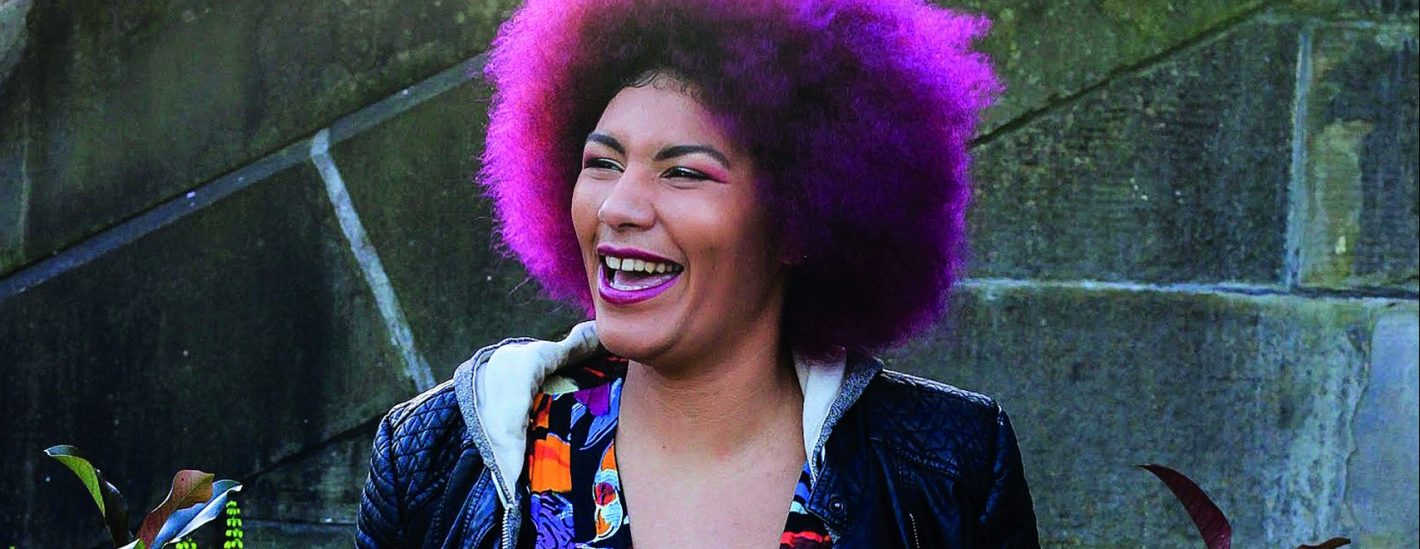Artist Interview: Ngaio
 By Resonate | February 13, 2020
By Resonate | February 13, 2020
Words by Hope Taylor
Photos by Abbie Humphries
We’re finally warming up. After a chilly outdoor photoshoot, multi-talented Bristolian performer, DJ and musical wonder Ngaio has brought us into St George’s café. Sat with a mulled wine and a Lemsip, the purple haired princess spoke to us on why she chose this setting for the interview. “It’s really nice to reflect on my own musical timeline with a space where I played when I was 21. I still play here every few years. There’s something about St George that has just always jumped out for me.”
Ngaio’s newest release, We Fly, brings a whole new life to the rhythm and blues genre, from punchy beats, to soulful lyrics, to exposed spoken word. You are truly taken on an emotional exploration of the difficulties she has faced during her life, something you won’t forget in a hurry.
When talking about Blackbird, the epic nine-minute long single from the EP We Fly, she says, “If you could unzip my soul and put it out there it would be that song.” Comparing this deeply personal piece to the more upbeat melodies that feature on the EP, such as Green Eyed Queen, Blackbird has a much rawer and uneasy feel to it. With inspiration taken from Fela Kuti, a Nigerian multi-instrumentalist and pioneer of the Afrobeat genre, Ngaio challenges classic songwriting rules and interrupts the seemingly sweet vocals with a powerful piece of spoken word that delves into multiple struggles. Growing up in the middle of rural Wales, Ngaio was the victim of some severe bullying, stating, “kids are fucking dickheads” as she begins to open up. “I didn’t understand why I was different and didn’t see being a brown person with the beauty with which I now see it,” she continues. “I always say, with Blackbird, I wrote it for myself as a nine-year-old.”
The piece has had a real effect on audiences, leaving some in tears with others personally thanking Ngaio for making them realise they aren’t as clued into inclusion and diversity as they thought. It’s a song that has allowed people to feel comfortable in admitting they have more to learn, without the feeling of guilt or shame. The track is there to educate and help people value their privilege and put it to good use.
Ngaio explains: “I say to people that we are going to go on a journey together and I think that’s great. I love songs that make you think about something. You start with one frame of mind and end with a different one.”
Ngaio has pioneered the way for female DJ’s since 2018. Her brand Booty Bass has been building a safe space for women to not only perform but shake what your mamma gave you. With a residency at The Plough, Ngaio explains that an important factor in her events is for her to be able to see the audience, so if something bad does happen, she can see it and stop it.
We are all used to hearing sexualised lyrics, however, on male-dominated nights things can quickly take a turn. She explains: “There’s not always a misogynistic edge to it, but there are definitely some places where you would see male-dominated crowds move towards women and it could get quite creepy quite quickly.” While there has been a real cultural shift around women feeling confident in speaking up, it’s been argued to leave some individuals with a victimised mindset, that they can’t get within 100 meters of a woman without being accused of something. Ngaio addresses this concern with typical directness. “IF YOUR BEHAVIOUR CREEPY OR WEIRD, NO YOU CAN’T, it’s not feminism gone mad its common human decency … JUST DON’T BE A FREAK”.
The passion for giving women a platform is a common theme in Ngaio’s work. She is signed to Saffron, a female-led record label with artist development programs and Mix Nights, a female DJ tuition collective. Ngaio also hosts How To Halt Harassment dinners to help the industry develop a concise framework for everyone to work towards. She has used her position, as an established artist in the Bristol music culture, to speak for women and others from marginalised backgrounds. She explains how everyone needs to work together to make a change, no matter how big or small.
“We all need to check our privilege so we can navigate the industry for other people. There’s no point in anyone trying to do it by themselves, none of us can do it by ourselves and it’s just a stupid thing to think. It shouldn’t just be LGBTQ+ people campaigning for LGBTQ+ rights. We should all be working together to make sure everybody’s life is at the highest quality it can be.”
It will come as no surprise that Ngaio’s advice is to foster collaboration admitting, “It can be a really lonely industry if you let it be.” However, in her case, knowing what you stand for and not waiting for your opportunities seems to be a recipe for success. “I wouldn’t be in the position that I’m in now if I hadn’t said fuck it, let’s put on a night,” she says.
Ngaio Anyia has been making waves in the industry but she’s far from done. With the British Council sending her to review the theatre festival in Lagos, diving even deeper into her consultancy work with built-in community resolve and values and releasing a remixed version of We Fly, we can’t wait to see what this incredible woman will do next.